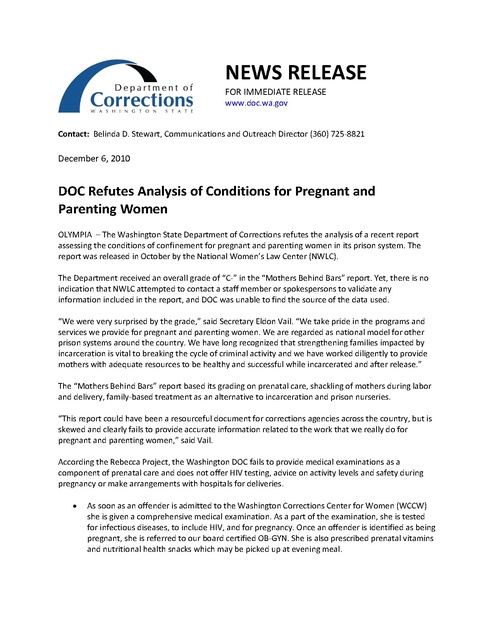Washington Doc Release Doc Refutes Analysis of Conditions for Pregnant and Parenting Women 2010
Download original document:

Document text

Document text
This text is machine-read, and may contain errors. Check the original document to verify accuracy.
~ Department of Corrections WASHINGTON NEWS RELEASE FOR IMMEDIATE RELEASE www.doc.wa.gov STATE Contact: Belinda D. Stewart, Communications and Outreach Director (360) 725-8821 December 6, 2010 DOC Refutes Analysis of Conditions for Pregnant and Parenting Women OLYMPIA – The Washington State Department of Corrections refutes the analysis of a recent report assessing the conditions of confinement for pregnant and parenting women in its prison system. The report was released in October by the National Women’s Law Center (NWLC). The Department received an overall grade of “C-” in the “Mothers Behind Bars” report. Yet, there is no indication that NWLC attempted to contact a staff member or spokespersons to validate any information included in the report, and DOC was unable to find the source of the data used. “We were very surprised by the grade,” said Secretary Eldon Vail. “We take pride in the programs and services we provide for pregnant and parenting women. We are regarded as national model for other prison systems around the country. We have long recognized that strengthening families impacted by incarceration is vital to breaking the cycle of criminal activity and we have worked diligently to provide mothers with adequate resources to be healthy and successful while incarcerated and after release.” The “Mothers Behind Bars” report based its grading on prenatal care, shackling of mothers during labor and delivery, family-based treatment as an alternative to incarceration and prison nurseries. “This report could have been a resourceful document for corrections agencies across the country, but is skewed and clearly fails to provide accurate information related to the work that we really do for pregnant and parenting women,” said Vail. According the Rebecca Project, the Washington DOC fails to provide medical examinations as a component of prenatal care and does not offer HIV testing, advice on activity levels and safety during pregnancy or make arrangements with hospitals for deliveries. • As soon as an offender is admitted to the Washington Corrections Center for Women (WCCW) she is given a comprehensive medical examination. As a part of the examination, she is tested for infectious diseases, to include HIV, and for pregnancy. Once an offender is identified as being pregnant, she is referred to our board certified OB-GYN. She is also prescribed prenatal vitamins and nutritional health snacks which may be picked up at evening meal. • Each pregnant offender is given a Health Status Report that provides directions to custody staff concerning offender limitations. Each offender is also seen by her primary provider monthly and counseled on activity level. • Pre-existing arrangements for labor and delivery are coordinated with our local hospital. Offenders are provided an infant care plan for when the baby is born, and volunteer Doulas to assist with the birthing process. Postpartum care is provided at the hospital with follow-up onsite at WCCW. The report did give the Washington DOC a good grade for its policies related to shackling of pregnant women during labor and delivery. • In June 2010, the Washington State Legislature passed laws which explicitly restrict the use of restraints during the third trimester of an offenders’ pregnancy or during postpartum recovery. On July 10, 2010, DOC Policy 420.250 was updated to comply with the law. The Rebecca Project also claims the Washington DOC does not provide family-based treatment as an alternative to incarceration for non-violent offenders. • In April 2010, the Washington State Legislature passed the Parenting Sentencing Alternative. The law has two distinct alternatives to confinement programs, a court alternative and a DOC alternative. The law went into effect in June 2010. • DOC’s alternative program is called the Community Parenting Alternative and allows the Department to transfer a mother or father to home detention using electronic monitoring for up to the last 12 months of their prison sentence. These offenders are under intensive supervision in the community and must continue to adhere to prison conduct standards when appropriate. They are also required to continue mental health treatment, substance abuse treatment and/or other programming. The Rebecca Project concludes that the Washington DOC does not offer a sufficient prison nursery program to new mothers who are incarcerated that focuses on improving the mother-child bond and provide therapeutic services. • The WCCW created a Residential Parenting Program in 1999 allowing select pregnant offenders with sentences less than 30 months to maintain custody of their babies after giving birth. The program provides mothers with the opportunity to be in a supervised environment that helps them bond with their children and learn good parenting skills from onsite Early Head Start staff. WCCW is the only known correctional facility in the United States that has a child development center inside prison walls. “I’m extremely satisfied with the work we’ve done,” said Vail. “I’m even more confident that we will continue to develop programs and services for pregnant and parenting women that will increase their likelihood of success. I’m open to speaking with anyone interested in discussing our efforts around incarcerated mothers.” -30-





